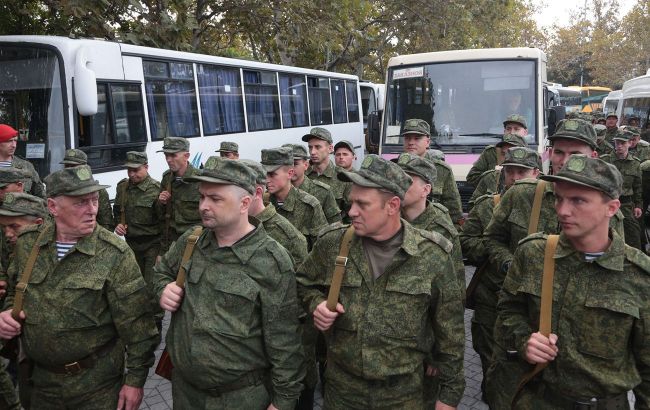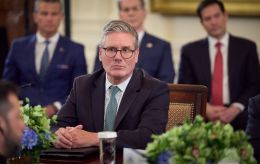Money fails to motivate Russians to fight in Ukraine - ISW
 Mobilized servicemen of the Russian army (Illustrative photo: Getty Images)
Mobilized servicemen of the Russian army (Illustrative photo: Getty Images)
Russia is seeing a decline in the number of volunteers for the war against Ukraine, indicating that the Kremlin's strategy of boosting army recruitment through high financial incentives is losing effectiveness, according to a report by the Institute for the Study of War (ISW).
The report cites information from the independent Russian-language outlet Idel Realii. According to it, employees of Russian military enlistment offices note that the number of people signing contracts with the Russian Ministry of Defense is not increasing, even in regions offering the highest financial payments. According to the sources, everyone who wanted to "make money from the war" has already signed up.
Idel Realii reports that as of now, the highest one-time signing bonus — 3.2 million rubles (about 39,300 dollars) — is offered by the Khanty-Mansi Autonomous Okrug.
On average, regional payments across Russia increase by 500,000 rubles (about 6,100 dollars) every three to four months. The decision of the Sverdlovsk region authorities in March 2025 to raise the one-time payment to 3.1 million rubles (about 38,100 dollars) did not lead to an influx of new applicants.
Employees of military enlistment offices in two unspecified Siberian regions reported that recently, contracts are mostly being signed by people of "extremely advanced age" or with chronic illnesses.
Sources of Idel Realii, in one of the towns in the northern part of the Irkutsk region, noted that recruitment problems have been observed for several months, and potential recruits are primarily interested only in the size of payments and military benefits, such as priority education for children, loan deferments, and debt write-offs. This indicates that those who agree to serve are motivated exclusively by material factors.
A source from the Irkutsk region told the outlet that the Russian Ministry of Defense is trying to attract recruits through advertising. This tactic was mainly used ahead of the US-Russia summit in Alaska on August 15 — at that time, the ministry claimed that the war would allegedly end soon, so it was worth it to "get millions before peace comes."
The same source said the Ministry of Defense misleads people by advertising how much they can earn in a year based on soldiers' monthly salaries in the combat zone. In reality, recruits are often sent not to the rear but on assault missions to the front line, where life expectancy is usually less than a year.
Two options for Putin
The Institute for the Study of War concluded back in February 2025 that further increases in financial incentives are unlikely to significantly raise the number of recruits, since a large portion of Russians who could be motivated by money within the state's means have already voluntarily joined the military.
The growth of payments and social benefits for service members indicates that recruitment rates are declining, and Russia is being forced to introduce new enlistment incentives.
"ISW continues to assess that decreases in Russian recruitment, such that Russia cannot replace its high casualty rates, could in part force Russian President Vladimir Putin to choose between conducting an involuntary reserve mobilization, which Putin has shown great reluctance to order, or coming to the negotiating table to end the war," the report says.
Mobilization campaign in Russia
Ukrainian President Volodymyr Zelenskyy stated that the large-scale mobilization in Russia may signal a shift toward a broader conflict with NATO countries and be a factor in the decline of Vladimir Putin's approval ratings.
At the end of September, the president signed a decree authorizing a record number of Russians to serve in the military from October 1 through the end of the current year.
At the same time, the Kremlin denies any connection between the large-scale mobilization and the war, promising not to send conscripts to the front.

